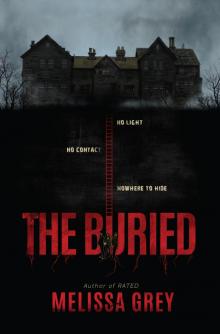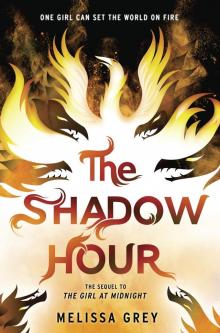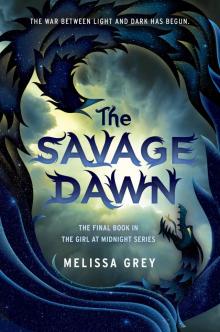- Home
- Melissa Grey
The Savage Dawn Page 2
The Savage Dawn Read online
Page 2
She should have said “Goodbye.”
She should have said “I’m sorry you got dragged into this mess.”
She should have said “Thank you for the macaron. It was lovely and I was so hungry and you were kind when I had known so little kindness.”
But she hadn’t said any of those things. She had left his broken body to rot in that dungeon, and now there was no one left to say anything to at all.
—
Echo stepped over broken glass and collapsed tables, making her way to the office where Perrin kept his account books.
The room itself was modest. Large, heavy tomes bound in unassuming brown leather lined the shelves, their spines embossed with golden dates spanning back to the late nineteenth century. The Agora had been around for a long time. When it was established, the island had been a Dutch colony by the name of New Amsterdam, and the market had weathered the years since. Perrin’s records were meticulously arranged in chronological order on shelves that covered every inch of wall space. The books’ bindings had been worn smooth by age and handling. The business had operated, like most Avicen enterprises, on a complicated bartering system. Echo’s involvement with Perrin had been relatively simple. He had requests. She fulfilled them, acquiring goods out in the human world that were difficult for an Avicen to come by, and in return, he kept her in a steady supply of shadow dust.
But she knew from watching him work in the shop that his other arrangements had not always been as simple. The shopkeeper had woven a complex web of favors and debts, and each of these books was a record of every transaction he had performed in the year stamped on its spine. The books had obviously been pulled off the shelves with frequency. There was a scant bit of dust on them from the months of neglect, but they still showed signs of once-regular usage. Echo had no doubt that Perrin remembered, with the aid of his detailed record keeping, every favor owed him by the Avicen—and occasional warlock—who passed through his shop. A less discerning eye might not have caught the slight aberration among the books, but Echo, who spent the vast majority of her life surrounded by books in various states of disrepair, noticed it.
A single ledger, almost identical to its neighbors. The year, written in faded golden lettering on its spine: 1961. Echo snatched at a fragment of memory: Perrin, listing the greatest baseball teams in the history of the sport during one of the slow days at his shop, when Echo had come around looking to stock up on shadow dust only to find herself roped into one of his diatribes on sports. She couldn’t remember most of what he had said, but she remembered the enthusiasm in his voice as he’d described the virtues of the 1961 Yankees: victors of that year’s World Series after defeating the Cincinnati Reds in five games; home to both Mickey Mantle and Roger Maris, who were famous for racing to beat Babe Ruth’s home run record. The memory would probably have remained buried deep in Echo’s subconscious if not for the condition of the ledger.
The spine was not cracked.
The leather showed signs of handling, particularly near the top where someone would have pressed their fingers to the book to pull it off the shelf. But unlike every other ledger in the office, it showed no sign of having been opened repeatedly. This book was not for reading. She rested her hand atop it and pulled.
The ledger did not slide off the shelf as it should have. Instead it angled forward like a lever. Echo continued applying gentle pressure to the book until she felt a click. The shelf swung toward her, revealing a shallow alcove set into the wall.
“Jackpot,” Echo whispered.
Inside the alcove were the treasures Perrin didn’t want found, some more obviously valuable than others. A triptych frame housed three tintypes of Avicen whom Echo had never seen before; the Avicen in the pictures were all short, like Perrin, and one of the younger ones had his deep-set eyes. Family, most likely. If the photos had been tucked away in this secret alcove, they had probably meant a great deal to Perrin. He would never be coming back for them, and it seemed wrong, somehow, to leave them there, forgotten. Echo slung her backpack off her shoulders and unzipped it. She carefully folded up the triptych and wrapped it in a scarf she found wadded up at the bottom of her backpack. Perhaps the Ala would know if Perrin had any surviving relatives who would appreciate the pictures. If not, then Echo would keep them, and even if she did not know the names of the Avicen in them, she would remember their faces. For Perrin.
On the alcove’s uppermost shelf, she found what she was looking for: a silver bowl, decorated with ornate etchings scrolling around its exterior. It was a scrying bowl. The same one Perrin must have used to track the bracelet he had given her. Inside the bowl’s basin was a ball made up of multicolored rubber bands. Echo put it aside, extremely doubtful that it was related to the bowl and its use. Perrin’s hoarding habits had always skirted toward the peculiar.
The bowl was heavy in her hands, far heavier than it looked. It must have been made out of solid silver, and not merely plated in it. The designs carved into the sides depicted roses tangled up with vines, and long, willowy branches of blossoming mugwort, with its distinctive thin, sharp leaves. Both flowers were common in divination rituals, and Echo suspected that carving them into the silver had amplified the magic of the bowl. She held it in both hands and breathed deeply. The Ala had been trying to teach her meditation techniques, but so far, Echo had proven to be an atrocious pupil. It was so rare for the wheels in her mind to stop spinning long enough for her to find that calm place the Ala insisted was there. Echo tried it now, pulling in slow, languid breaths, focusing on nothing but the silver bowl. The weight of it. How it felt in her hands.
Her eyes closed. In the silence, she listened for the sound of the blood rushing through her veins, the beating of her heart, the flow of air in her lungs. And then she found it. That calm place. Once she was there, she knew exactly what the Ala had meant during those interminable lectures. She was hyperaware of the nerve endings in her skin. All her senses were heightened. She heard a mouse scuttle across the floor in the main room of the shop, the faint murmur of voices out in the Agora as the warlocks went about their business. The silver bowl was cool against her palms, and the more Echo focused her attention on it, the more she noticed about it. There was magic in it, worked into the metal itself, perhaps by whoever had done the carvings.
No ordinary bowl would hum with that kind of energy.
Echo opened her eyes. The sensation of magic left her in a dizzying wave, like air rushing from her lungs after a punch to the gut. The Ala had mentioned something about disengaging from a meditative state, but Echo hadn’t really been listening. Now she wished she had. She took a moment to steady herself. Her skin felt like it was stretched a little too tight over her skeleton, and the sounds that she had noticed had retreated back into silence, too slight or far away for her to hear them. She made a vow to herself to actually listen when the Ala was imparting wisdom the next time they sat down for a chat. There was so much for Echo to learn, so much that she did not understand. Arming herself with knowledge had always been her way of making herself not feel quite so helpless. Even when she had been a tiny runaway, living off stolen scraps, she’d had the books in her library to ground her. Listening wasn’t as easy as reading, at least not for Echo, but she made a silent promise to do better in the future. The Ala needed Echo at her best. All of her friends—her family—did.
Caius did.
And that was what she would give them.
Echo put the bowl in her backpack and zipped it up. She gave the room a final, cursory glance. Maybe the Ala could send someone down here—if there was anyone to spare—to gather Perrin’s things. Or maybe even take over the shop. The world would return to normal. Echo would make sure of that. Or die trying. Either way.
She slung her bag over her shoulder and exited Perrin’s Enchanting Essentials, possibly for the last time.
Rowan quirked a questioning eyebrow at her as she joined him. “Did you find it?”
She nodded. “Right where I thought it would
be.”
“Good,” said Rowan. “Let’s get out of here before those warlocks find the courage to try to catch themselves a firebird.”
“You know, I think I liked it better when no one paid me the slightest bit of attention.” But those days, Echo mused, were long gone. She was someone now, whether she liked it or not.
Armed with the newfound scrying bowl, Echo made her way out of the Agora, ignoring the curious stares of the warlocks and Rowan’s answering glares. She felt lighter as she left, soothed by the fact that she was being productive, that she had purpose. With a skip in her step, she exited the market’s secret entrance, in the hot dog restaurant on St. Marks Place, and breathed in some not-so-fresh city air.
Onward and upward, Echo thought. There was work to be done. She had a locator spell to learn and a lost prince to find.
CHAPTER TWO
“We need more power.”
Disembodied voices broke through Caius’s half-conscious haze. For hours, he had drifted in and out of wakefulness, only vaguely aware of the hands that propped him up and moved him from place to place as if he were nothing more than an inconvenient sack of potatoes. He was not blindfolded, but he might as well have been. His eyes stubbornly refused to open to let him survey his surroundings; they were still bruised and swollen from the two punches that had knocked him out. The force of a gauntleted fist crashing into his head had been more than enough to put him to sleep for an indeterminate amount of time. Hours, maybe. Gods, perhaps even days.
A different voice responded to the first. This one he recognized, and the familiarity of it made Caius’s stomach turn.
“Bring him to me.”
Hands seized him once more and hefted him upright so that he was almost standing, even though his legs did not seem inclined to support him. He sagged between his captors, and a small part of him wished that they would let him fall, that they would allow him to slip into the sweet oblivion of unconsciousness. An armored fist to the face seemed preferable to facing the person who had just spoken.
He did not want to look upon his sister and see what she had become. Tanith, it would seem, had other plans.
Although he could not see his surroundings, Caius could tell the space was damp—there was a faint scent of decay permeating the air, reminding him of long-dead plants and the whiff of rot he associated with the catacombs deep beneath Wyvern’s Keep. They were underground. Probably very far underground.
He tried to take stock of what his other senses told him about the space in which he was being held and the number of people holding him. His sister was one. The soldiers on either side of him were two more. Firedrakes, he assumed. There was a faint scuffle of boots about two or three yards to his left, if he correctly judged the distance the sound traveled. Armor creaking off to his right. Pages of a book flipped behind him accompanied by the tinkling chime of glass settling against glass. Too small and delicate to belong to something large, Caius noted. Perhaps the small vials carried by healers or mages.
Seven people, then. Maybe eight. Healers often performed their duties solo, but Drakharin mages operated in pairs. In front of him, where Caius assumed his sister was, another voice whispered something in unintelligible Drakhar. Eight people, then. A paltry number to hold a Dragon Prince captive, even a dethroned one. If he was in fighting form, eight opponents would not present much of a challenge, even if he were unarmed. The body was a weapon; Caius’s trainers had drilled that into him from an early age. He had molded his to be as strong and as deadly as steel. Few could meet him in combat and live to tell the tale. His sister would have tried, but he had bested her in the sparring ring more times than he could count. On a good day, they were very nearly evenly matched, though Caius’s height and reach gave him a marginal advantage.
But today was not a good day.
The two soldiers holding him up dragged him forward a few feet, only to dump him unceremoniously on the ground. Caius was so exhausted, so thoroughly drained from his ordeal thus far, that he barely registered the pain of his knees smacking into hard stone.
Fingers brushed against the bruising on his face and he fought not to flinch. It was an instinctive response. A Dragon Prince does not cower. A Dragon Prince does not show fear. But then, he was no longer a Dragon Prince.
“Always so brave,” said his sister. She pressed at the center of the worst bruising on his cheekbone, and the pain was so severe, he thought he might vomit. Maybe that would serve her right, to have the brother she tormented spew his sick all over her shiny golden boots.
Her hand retreated, and it was only then that Caius realized what had felt so wrong about it. Aside from the obvious.
Her skin was cold.
Drakharin tended to run hot; their core temperature exceeded that of both humans and Avicen. But Tanith possessed a unique ability, once common among their kind, now extremely rare. Fire danced in her veins, the same way the power of the in-between lived in Caius’s. Fire was her element to call, and it had always felt as though it were simmering below the surface of her skin, as if her skeleton were made not of bone, but of blazing embers.
But now her skin was cold. Unnaturally so.
“You know I take no pleasure in this,” said Tanith.
Caius could not resist the urge to spit at her feet. Without sight, he couldn’t aim, and wasn’t sure if he’d hit her, but the disgusted noise she made at the display proved that he had made his point. He decided to drive it home with a single word: “Liar.”
A fist seized his hair, yanking his head upward. When Tanith spoke next, it was not to him, but to one of the healers or mages who’d been fiddling with the books and glass vials behind him.
“Heal him.” The words did not match his sister’s tone. This would be no benevolent act of healing. An undercurrent of violence lived in that command, promising more pain to follow. Caius gritted his teeth. He would not cower. Not now. Not ever. Tanith continued speaking, each word more poisonous than the last. “I want him to see me when I reduce him to nothing. I want to watch the light go out of his eyes.”
The warm glow of healing magic washed over Caius as the healer obeyed Tanith’s order. It wasn’t a complete healing; the throbbing of the bruises on his face eased and the headache that had lingered since he regained consciousness faded, but the limited relief only made him more aware of the cuts and bruises on the rest of his body.
“Open your eyes, Brother.” Tanith relinquished her grip on his hair. “Look. See what I have wrought.”
Caius did as she commanded, quelling the urge to rebel out of spite. Light seared his vision as his eyes adjusted to being used for the first time in days. Even as the initial burn faded, he couldn’t quite make sense of what he was seeing.
They were not in the catacombs beneath the keep; they were in a tomb. Alcoves set deep into the walls housed skeletons gone yellow with age. Caius caught sight of random weapons and pieces of armor: the broken blade of a bronze sword here, the pale green of a rusted helm there. The walls themselves were made of bones packed so tightly together that they appeared at first glance to be stone. Every few inches a row of teeth or an empty eye socket protruded from the wall, a grotesque reminder of the materials that comprised it. By the time Wyvern’s Keep had been built, the fashion of burying the honored dead in palaces of bone had long since passed, but Caius recognized the style of architecture. This was a warriors’ tomb, where victors were laid to rest among the remains of the vanquished.
The walls, however, were not the room’s most arresting sight. Set into the middle of the floor was what appeared to be a large, round metal seal. A crest had been etched into its surface; Caius did not immediately recognize the language of the text encircling it, but the symbols were familiar. He had come across similar pictographs in his research when he was hunting for the firebird. It was an ancient writing system, the secrets of which he had assumed were long lost.
A crack ran through the center of the seal, and from it arose the telltale black tendrils of the
in-between. Caius could feel the magic pulsing through the rift. It was like the song of a siren beckoning sailors closer, aching for the satisfying destruction of ships crashing against rocks. It called to him, stronger than any normal gateway. There was something distressingly not right about the scene.
As he watched, the crack grew wider, and the power emanating from it became suffocating.
“You heard what the mage said,” came Tanith’s voice. Caius tore his eyes from the seal to look at her and immediately wished he hadn’t.
The crimson had bled out of her eyes and been replaced by an inky black, which made it seem as if another mind was looking out from behind his sister’s eyes. Dark veins ran up her bare arms, twisting and twining like the branches of a tree in winter. The color had been drained from her lips, giving her the sickly, pale appearance of a corpse dredged up from a river. Caius wanted to close his eyes again. The thing standing in front of him was not his sister. He could not think of her as such. His sister had been a being of fire and gold, blood and steel. This…this was something else entirely.
Cold fingers clamped around his chin. The second Tanith’s skin touched his, he felt the energy seep out of him. He had so little left to give that it reduced him to a slow trickle, a painful sludge. Tanith pulled his power from him as if she were gutting a beast she had felled in a hunt.

 Rated
Rated The Buried
The Buried The Shadow Hour
The Shadow Hour The Savage Dawn
The Savage Dawn